Analyzing Amnesia: A Case Study of E.P. and Cognitive Theory of Mind
VerifiedAdded on 2023/06/04
|10
|2406
|151
Essay
AI Summary
This essay delves into the complexities of amnesia, a brain disorder characterized by memory dysfunction, using the case study of E.P., a patient suffering from both anterograde and retrograde amnesia due to viral encephalitis. The essay discusses the various types of amnesia, including anterograde, retrograde, and transient global amnesia, and examines the cognitive theory of consolidation as a potential explanation for memory loss and recovery. The case of E.P., who experienced severe damage to the medial temporal lobe, is analyzed in the context of consolidation theory, which posits that memories are strengthened and stabilized over time through long-term potentiation. The essay concludes by highlighting the challenges in understanding amnesia and the need for further research, while acknowledging the limitations of the chosen case study and suggesting future studies with larger samples.
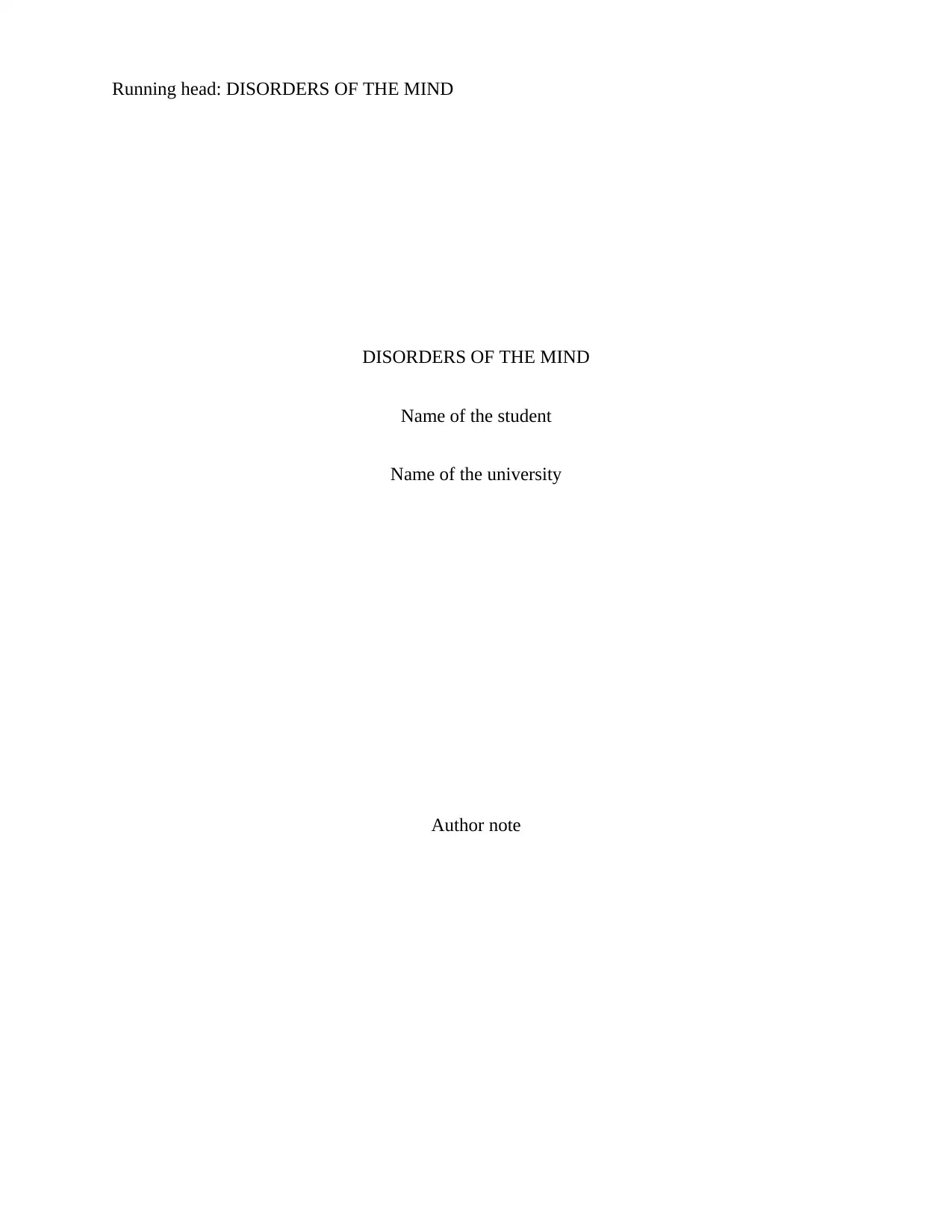
Running head: DISORDERS OF THE MIND
DISORDERS OF THE MIND
Name of the student
Name of the university
Author note
DISORDERS OF THE MIND
Name of the student
Name of the university
Author note
Paraphrase This Document
Need a fresh take? Get an instant paraphrase of this document with our AI Paraphraser
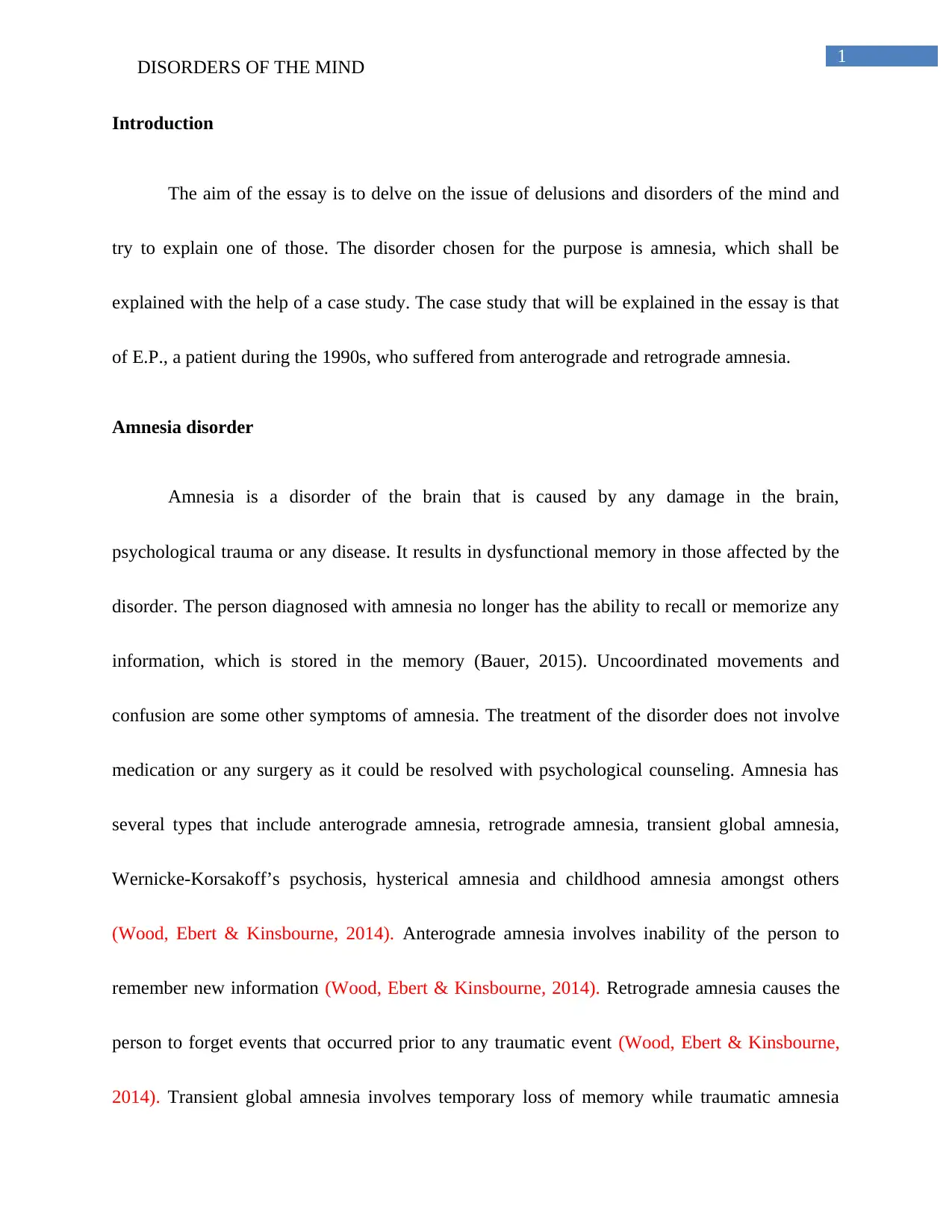
1
DISORDERS OF THE MIND
Introduction
The aim of the essay is to delve on the issue of delusions and disorders of the mind and
try to explain one of those. The disorder chosen for the purpose is amnesia, which shall be
explained with the help of a case study. The case study that will be explained in the essay is that
of E.P., a patient during the 1990s, who suffered from anterograde and retrograde amnesia.
Amnesia disorder
Amnesia is a disorder of the brain that is caused by any damage in the brain,
psychological trauma or any disease. It results in dysfunctional memory in those affected by the
disorder. The person diagnosed with amnesia no longer has the ability to recall or memorize any
information, which is stored in the memory (Bauer, 2015). Uncoordinated movements and
confusion are some other symptoms of amnesia. The treatment of the disorder does not involve
medication or any surgery as it could be resolved with psychological counseling. Amnesia has
several types that include anterograde amnesia, retrograde amnesia, transient global amnesia,
Wernicke-Korsakoff’s psychosis, hysterical amnesia and childhood amnesia amongst others
(Wood, Ebert & Kinsbourne, 2014). Anterograde amnesia involves inability of the person to
remember new information (Wood, Ebert & Kinsbourne, 2014). Retrograde amnesia causes the
person to forget events that occurred prior to any traumatic event (Wood, Ebert & Kinsbourne,
2014). Transient global amnesia involves temporary loss of memory while traumatic amnesia
DISORDERS OF THE MIND
Introduction
The aim of the essay is to delve on the issue of delusions and disorders of the mind and
try to explain one of those. The disorder chosen for the purpose is amnesia, which shall be
explained with the help of a case study. The case study that will be explained in the essay is that
of E.P., a patient during the 1990s, who suffered from anterograde and retrograde amnesia.
Amnesia disorder
Amnesia is a disorder of the brain that is caused by any damage in the brain,
psychological trauma or any disease. It results in dysfunctional memory in those affected by the
disorder. The person diagnosed with amnesia no longer has the ability to recall or memorize any
information, which is stored in the memory (Bauer, 2015). Uncoordinated movements and
confusion are some other symptoms of amnesia. The treatment of the disorder does not involve
medication or any surgery as it could be resolved with psychological counseling. Amnesia has
several types that include anterograde amnesia, retrograde amnesia, transient global amnesia,
Wernicke-Korsakoff’s psychosis, hysterical amnesia and childhood amnesia amongst others
(Wood, Ebert & Kinsbourne, 2014). Anterograde amnesia involves inability of the person to
remember new information (Wood, Ebert & Kinsbourne, 2014). Retrograde amnesia causes the
person to forget events that occurred prior to any traumatic event (Wood, Ebert & Kinsbourne,
2014). Transient global amnesia involves temporary loss of memory while traumatic amnesia
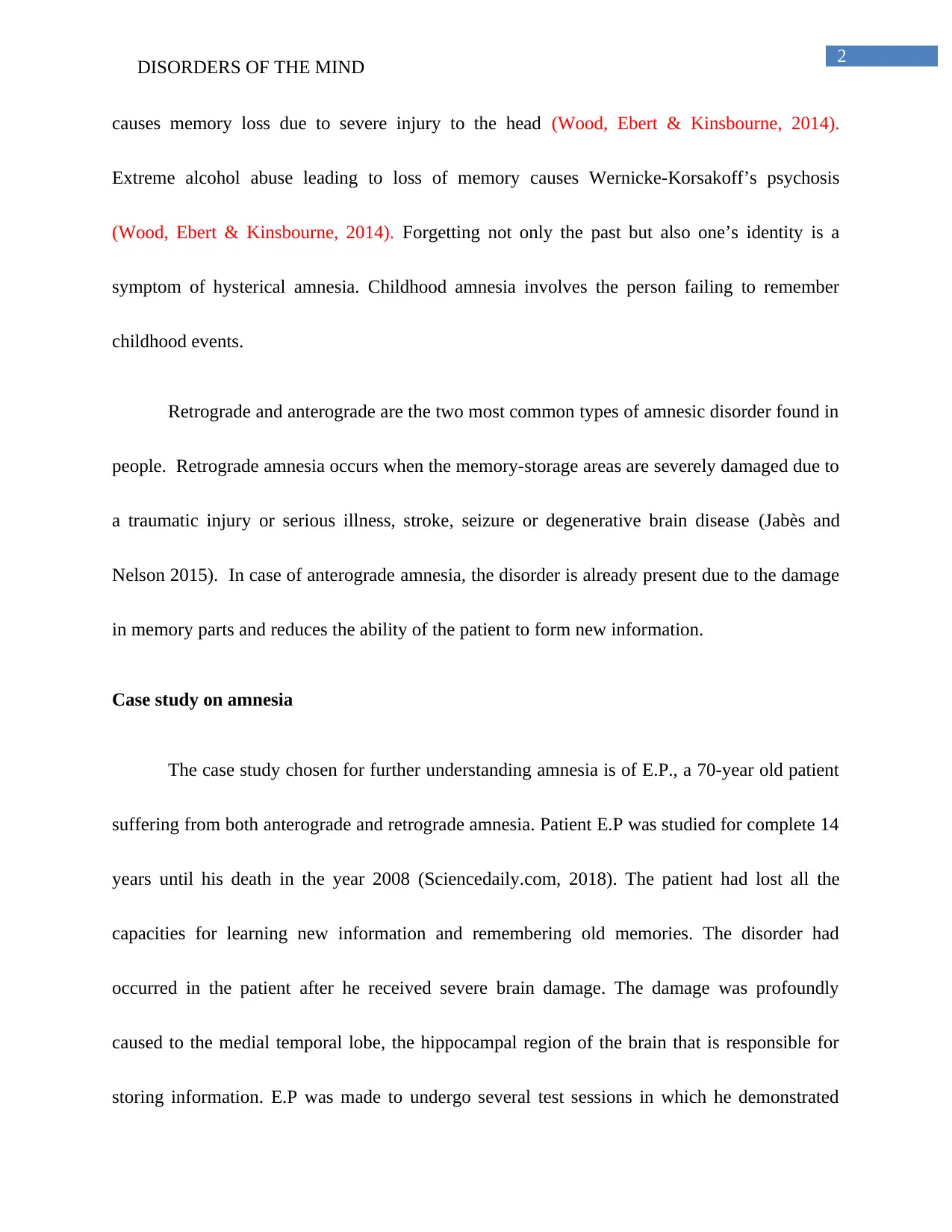
2
DISORDERS OF THE MIND
causes memory loss due to severe injury to the head (Wood, Ebert & Kinsbourne, 2014).
Extreme alcohol abuse leading to loss of memory causes Wernicke-Korsakoff’s psychosis
(Wood, Ebert & Kinsbourne, 2014). Forgetting not only the past but also one’s identity is a
symptom of hysterical amnesia. Childhood amnesia involves the person failing to remember
childhood events.
Retrograde and anterograde are the two most common types of amnesic disorder found in
people. Retrograde amnesia occurs when the memory-storage areas are severely damaged due to
a traumatic injury or serious illness, stroke, seizure or degenerative brain disease (Jabès and
Nelson 2015). In case of anterograde amnesia, the disorder is already present due to the damage
in memory parts and reduces the ability of the patient to form new information.
Case study on amnesia
The case study chosen for further understanding amnesia is of E.P., a 70-year old patient
suffering from both anterograde and retrograde amnesia. Patient E.P was studied for complete 14
years until his death in the year 2008 (Sciencedaily.com, 2018). The patient had lost all the
capacities for learning new information and remembering old memories. The disorder had
occurred in the patient after he received severe brain damage. The damage was profoundly
caused to the medial temporal lobe, the hippocampal region of the brain that is responsible for
storing information. E.P was made to undergo several test sessions in which he demonstrated
DISORDERS OF THE MIND
causes memory loss due to severe injury to the head (Wood, Ebert & Kinsbourne, 2014).
Extreme alcohol abuse leading to loss of memory causes Wernicke-Korsakoff’s psychosis
(Wood, Ebert & Kinsbourne, 2014). Forgetting not only the past but also one’s identity is a
symptom of hysterical amnesia. Childhood amnesia involves the person failing to remember
childhood events.
Retrograde and anterograde are the two most common types of amnesic disorder found in
people. Retrograde amnesia occurs when the memory-storage areas are severely damaged due to
a traumatic injury or serious illness, stroke, seizure or degenerative brain disease (Jabès and
Nelson 2015). In case of anterograde amnesia, the disorder is already present due to the damage
in memory parts and reduces the ability of the patient to form new information.
Case study on amnesia
The case study chosen for further understanding amnesia is of E.P., a 70-year old patient
suffering from both anterograde and retrograde amnesia. Patient E.P was studied for complete 14
years until his death in the year 2008 (Sciencedaily.com, 2018). The patient had lost all the
capacities for learning new information and remembering old memories. The disorder had
occurred in the patient after he received severe brain damage. The damage was profoundly
caused to the medial temporal lobe, the hippocampal region of the brain that is responsible for
storing information. E.P was made to undergo several test sessions in which he demonstrated
⊘ This is a preview!⊘
Do you want full access?
Subscribe today to unlock all pages.

Trusted by 1+ million students worldwide
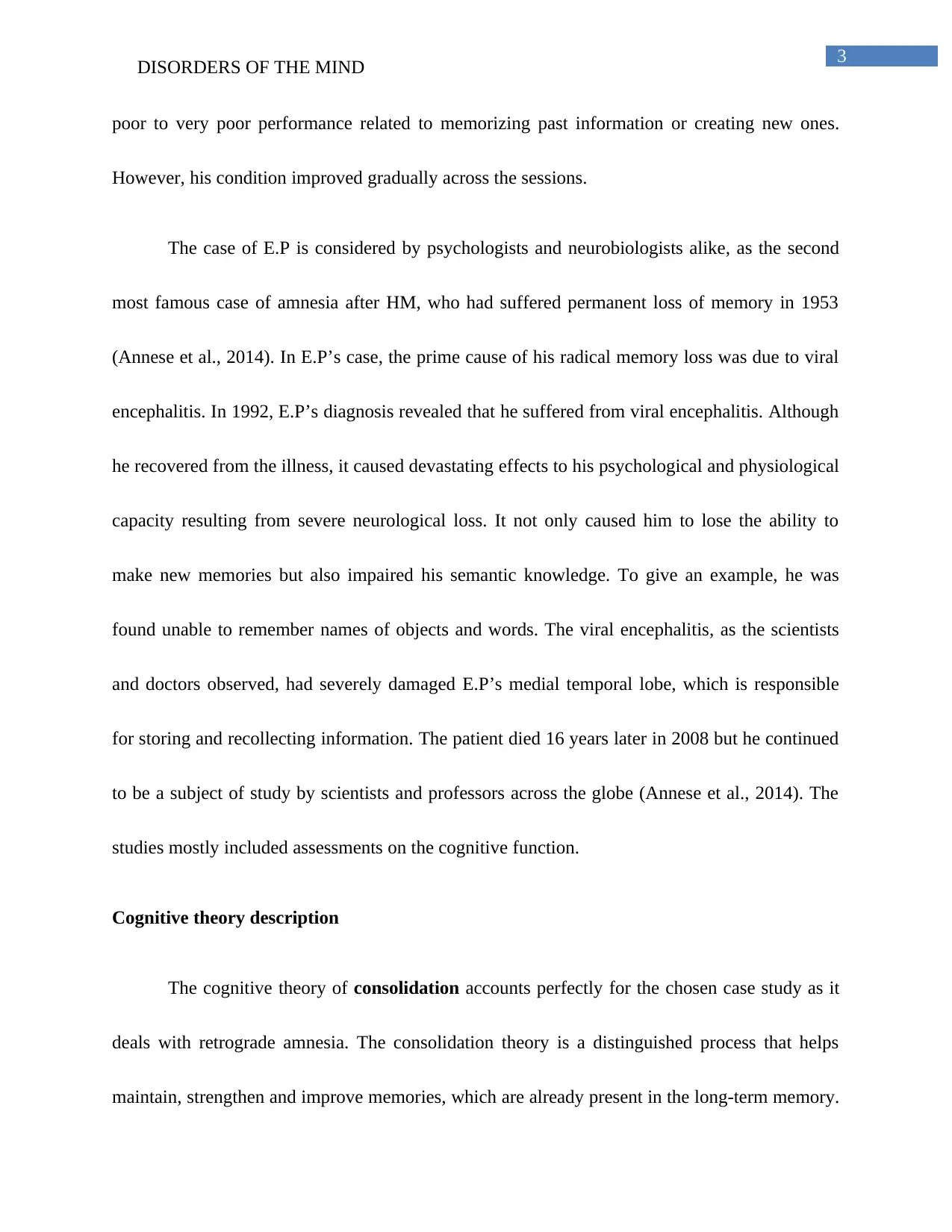
3
DISORDERS OF THE MIND
poor to very poor performance related to memorizing past information or creating new ones.
However, his condition improved gradually across the sessions.
The case of E.P is considered by psychologists and neurobiologists alike, as the second
most famous case of amnesia after HM, who had suffered permanent loss of memory in 1953
(Annese et al., 2014). In E.P’s case, the prime cause of his radical memory loss was due to viral
encephalitis. In 1992, E.P’s diagnosis revealed that he suffered from viral encephalitis. Although
he recovered from the illness, it caused devastating effects to his psychological and physiological
capacity resulting from severe neurological loss. It not only caused him to lose the ability to
make new memories but also impaired his semantic knowledge. To give an example, he was
found unable to remember names of objects and words. The viral encephalitis, as the scientists
and doctors observed, had severely damaged E.P’s medial temporal lobe, which is responsible
for storing and recollecting information. The patient died 16 years later in 2008 but he continued
to be a subject of study by scientists and professors across the globe (Annese et al., 2014). The
studies mostly included assessments on the cognitive function.
Cognitive theory description
The cognitive theory of consolidation accounts perfectly for the chosen case study as it
deals with retrograde amnesia. The consolidation theory is a distinguished process that helps
maintain, strengthen and improve memories, which are already present in the long-term memory.
DISORDERS OF THE MIND
poor to very poor performance related to memorizing past information or creating new ones.
However, his condition improved gradually across the sessions.
The case of E.P is considered by psychologists and neurobiologists alike, as the second
most famous case of amnesia after HM, who had suffered permanent loss of memory in 1953
(Annese et al., 2014). In E.P’s case, the prime cause of his radical memory loss was due to viral
encephalitis. In 1992, E.P’s diagnosis revealed that he suffered from viral encephalitis. Although
he recovered from the illness, it caused devastating effects to his psychological and physiological
capacity resulting from severe neurological loss. It not only caused him to lose the ability to
make new memories but also impaired his semantic knowledge. To give an example, he was
found unable to remember names of objects and words. The viral encephalitis, as the scientists
and doctors observed, had severely damaged E.P’s medial temporal lobe, which is responsible
for storing and recollecting information. The patient died 16 years later in 2008 but he continued
to be a subject of study by scientists and professors across the globe (Annese et al., 2014). The
studies mostly included assessments on the cognitive function.
Cognitive theory description
The cognitive theory of consolidation accounts perfectly for the chosen case study as it
deals with retrograde amnesia. The consolidation theory is a distinguished process that helps
maintain, strengthen and improve memories, which are already present in the long-term memory.
Paraphrase This Document
Need a fresh take? Get an instant paraphrase of this document with our AI Paraphraser
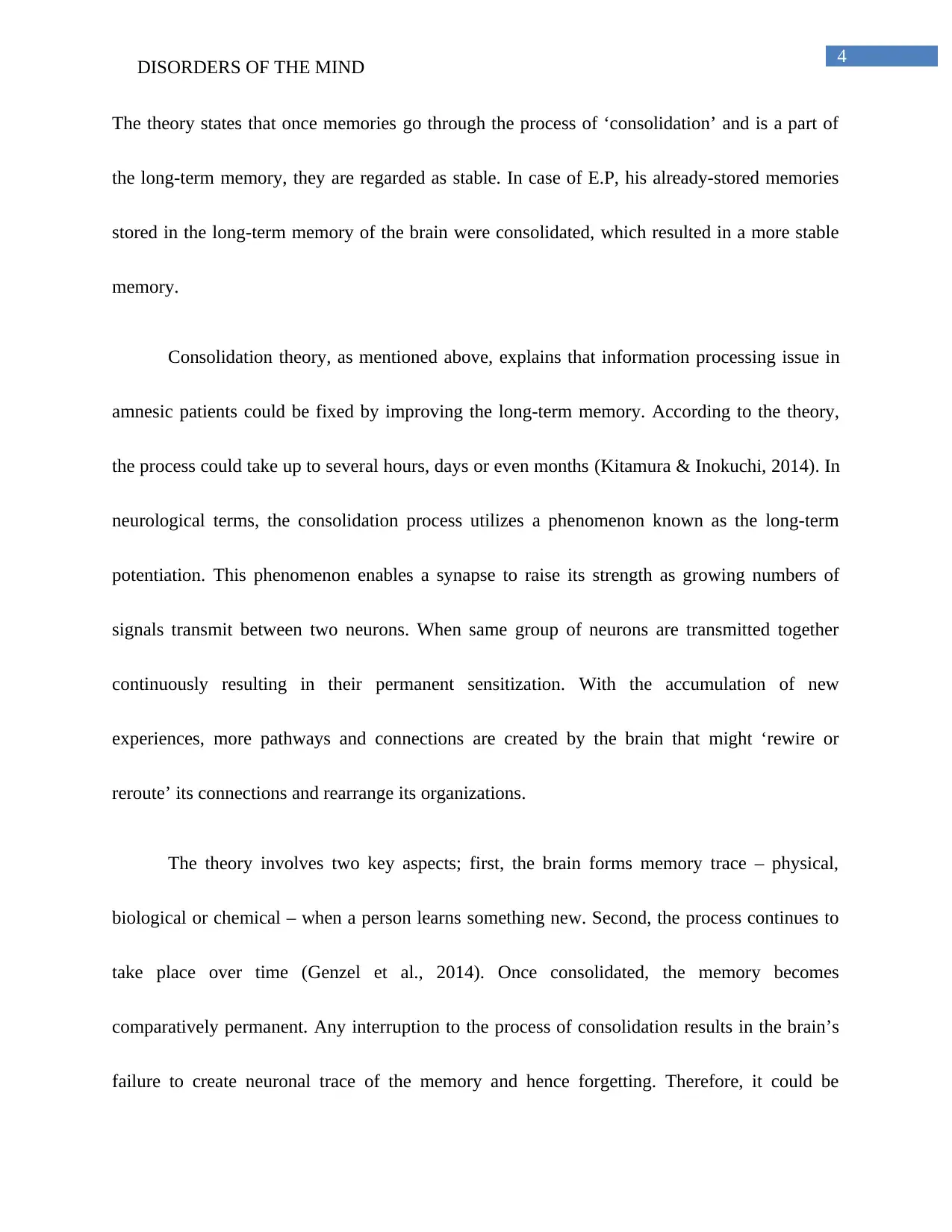
4
DISORDERS OF THE MIND
The theory states that once memories go through the process of ‘consolidation’ and is a part of
the long-term memory, they are regarded as stable. In case of E.P, his already-stored memories
stored in the long-term memory of the brain were consolidated, which resulted in a more stable
memory.
Consolidation theory, as mentioned above, explains that information processing issue in
amnesic patients could be fixed by improving the long-term memory. According to the theory,
the process could take up to several hours, days or even months (Kitamura & Inokuchi, 2014). In
neurological terms, the consolidation process utilizes a phenomenon known as the long-term
potentiation. This phenomenon enables a synapse to raise its strength as growing numbers of
signals transmit between two neurons. When same group of neurons are transmitted together
continuously resulting in their permanent sensitization. With the accumulation of new
experiences, more pathways and connections are created by the brain that might ‘rewire or
reroute’ its connections and rearrange its organizations.
The theory involves two key aspects; first, the brain forms memory trace – physical,
biological or chemical – when a person learns something new. Second, the process continues to
take place over time (Genzel et al., 2014). Once consolidated, the memory becomes
comparatively permanent. Any interruption to the process of consolidation results in the brain’s
failure to create neuronal trace of the memory and hence forgetting. Therefore, it could be
DISORDERS OF THE MIND
The theory states that once memories go through the process of ‘consolidation’ and is a part of
the long-term memory, they are regarded as stable. In case of E.P, his already-stored memories
stored in the long-term memory of the brain were consolidated, which resulted in a more stable
memory.
Consolidation theory, as mentioned above, explains that information processing issue in
amnesic patients could be fixed by improving the long-term memory. According to the theory,
the process could take up to several hours, days or even months (Kitamura & Inokuchi, 2014). In
neurological terms, the consolidation process utilizes a phenomenon known as the long-term
potentiation. This phenomenon enables a synapse to raise its strength as growing numbers of
signals transmit between two neurons. When same group of neurons are transmitted together
continuously resulting in their permanent sensitization. With the accumulation of new
experiences, more pathways and connections are created by the brain that might ‘rewire or
reroute’ its connections and rearrange its organizations.
The theory involves two key aspects; first, the brain forms memory trace – physical,
biological or chemical – when a person learns something new. Second, the process continues to
take place over time (Genzel et al., 2014). Once consolidated, the memory becomes
comparatively permanent. Any interruption to the process of consolidation results in the brain’s
failure to create neuronal trace of the memory and hence forgetting. Therefore, it could be
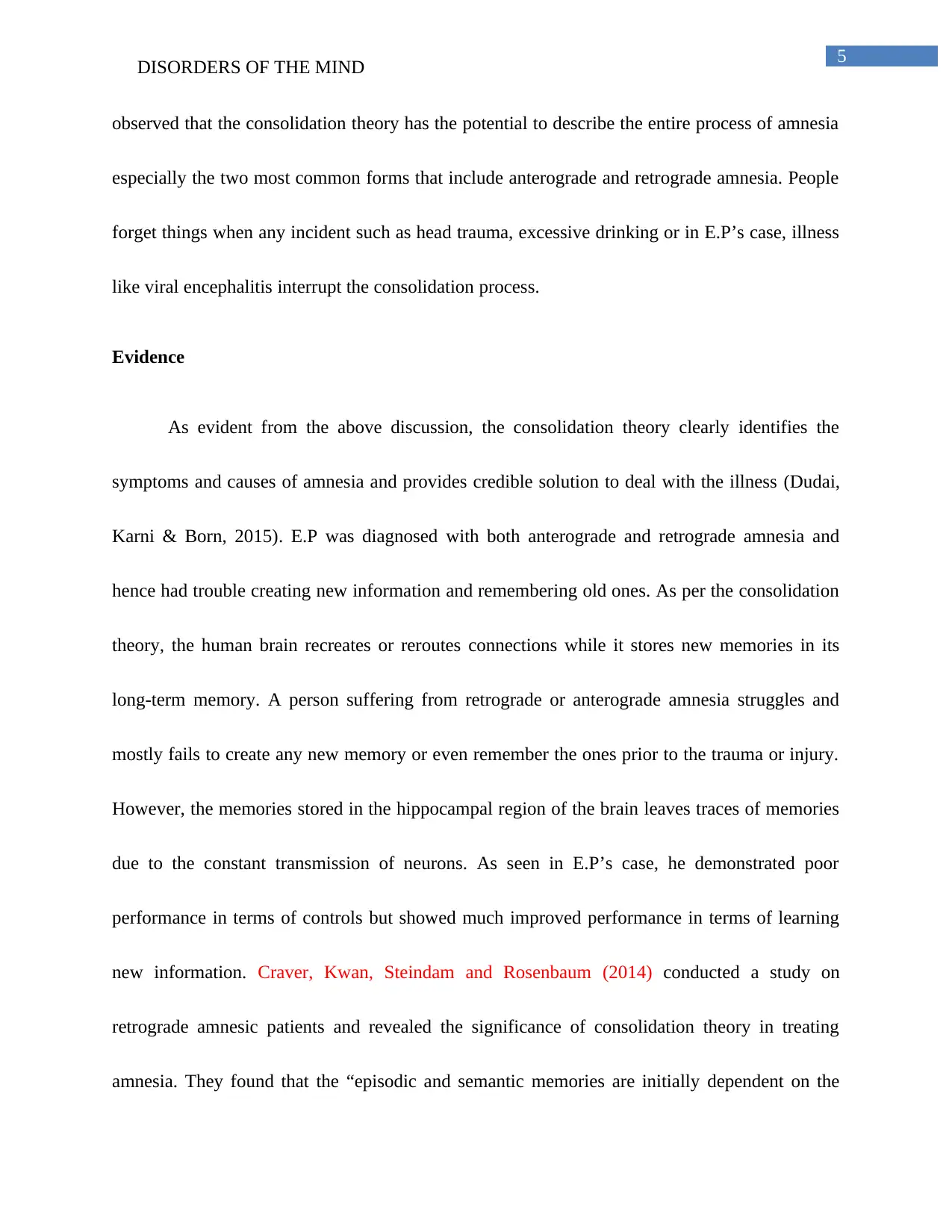
5
DISORDERS OF THE MIND
observed that the consolidation theory has the potential to describe the entire process of amnesia
especially the two most common forms that include anterograde and retrograde amnesia. People
forget things when any incident such as head trauma, excessive drinking or in E.P’s case, illness
like viral encephalitis interrupt the consolidation process.
Evidence
As evident from the above discussion, the consolidation theory clearly identifies the
symptoms and causes of amnesia and provides credible solution to deal with the illness (Dudai,
Karni & Born, 2015). E.P was diagnosed with both anterograde and retrograde amnesia and
hence had trouble creating new information and remembering old ones. As per the consolidation
theory, the human brain recreates or reroutes connections while it stores new memories in its
long-term memory. A person suffering from retrograde or anterograde amnesia struggles and
mostly fails to create any new memory or even remember the ones prior to the trauma or injury.
However, the memories stored in the hippocampal region of the brain leaves traces of memories
due to the constant transmission of neurons. As seen in E.P’s case, he demonstrated poor
performance in terms of controls but showed much improved performance in terms of learning
new information. Craver, Kwan, Steindam and Rosenbaum (2014) conducted a study on
retrograde amnesic patients and revealed the significance of consolidation theory in treating
amnesia. They found that the “episodic and semantic memories are initially dependent on the
DISORDERS OF THE MIND
observed that the consolidation theory has the potential to describe the entire process of amnesia
especially the two most common forms that include anterograde and retrograde amnesia. People
forget things when any incident such as head trauma, excessive drinking or in E.P’s case, illness
like viral encephalitis interrupt the consolidation process.
Evidence
As evident from the above discussion, the consolidation theory clearly identifies the
symptoms and causes of amnesia and provides credible solution to deal with the illness (Dudai,
Karni & Born, 2015). E.P was diagnosed with both anterograde and retrograde amnesia and
hence had trouble creating new information and remembering old ones. As per the consolidation
theory, the human brain recreates or reroutes connections while it stores new memories in its
long-term memory. A person suffering from retrograde or anterograde amnesia struggles and
mostly fails to create any new memory or even remember the ones prior to the trauma or injury.
However, the memories stored in the hippocampal region of the brain leaves traces of memories
due to the constant transmission of neurons. As seen in E.P’s case, he demonstrated poor
performance in terms of controls but showed much improved performance in terms of learning
new information. Craver, Kwan, Steindam and Rosenbaum (2014) conducted a study on
retrograde amnesic patients and revealed the significance of consolidation theory in treating
amnesia. They found that the “episodic and semantic memories are initially dependent on the
⊘ This is a preview!⊘
Do you want full access?
Subscribe today to unlock all pages.

Trusted by 1+ million students worldwide
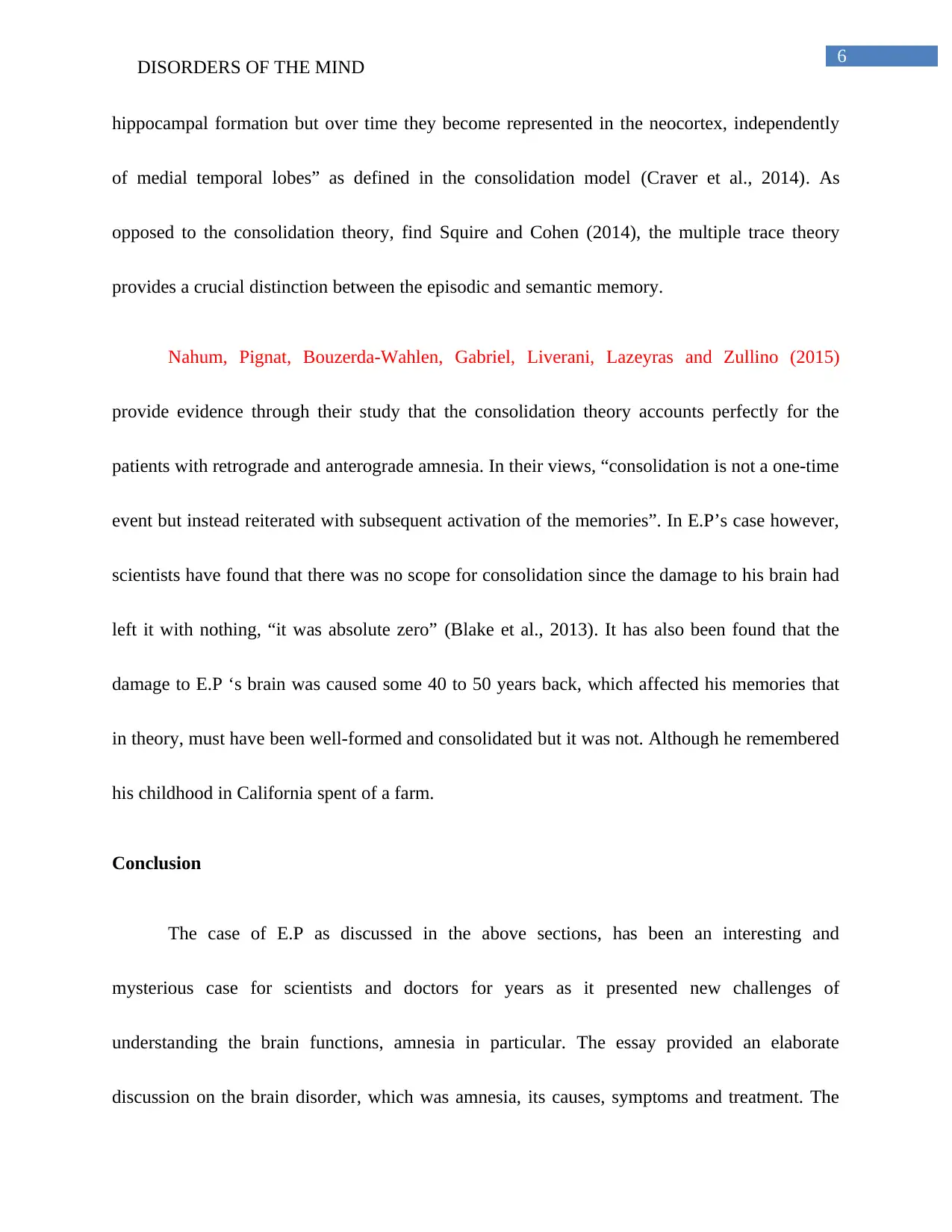
6
DISORDERS OF THE MIND
hippocampal formation but over time they become represented in the neocortex, independently
of medial temporal lobes” as defined in the consolidation model (Craver et al., 2014). As
opposed to the consolidation theory, find Squire and Cohen (2014), the multiple trace theory
provides a crucial distinction between the episodic and semantic memory.
Nahum, Pignat, Bouzerda-Wahlen, Gabriel, Liverani, Lazeyras and Zullino (2015)
provide evidence through their study that the consolidation theory accounts perfectly for the
patients with retrograde and anterograde amnesia. In their views, “consolidation is not a one-time
event but instead reiterated with subsequent activation of the memories”. In E.P’s case however,
scientists have found that there was no scope for consolidation since the damage to his brain had
left it with nothing, “it was absolute zero” (Blake et al., 2013). It has also been found that the
damage to E.P ‘s brain was caused some 40 to 50 years back, which affected his memories that
in theory, must have been well-formed and consolidated but it was not. Although he remembered
his childhood in California spent of a farm.
Conclusion
The case of E.P as discussed in the above sections, has been an interesting and
mysterious case for scientists and doctors for years as it presented new challenges of
understanding the brain functions, amnesia in particular. The essay provided an elaborate
discussion on the brain disorder, which was amnesia, its causes, symptoms and treatment. The
DISORDERS OF THE MIND
hippocampal formation but over time they become represented in the neocortex, independently
of medial temporal lobes” as defined in the consolidation model (Craver et al., 2014). As
opposed to the consolidation theory, find Squire and Cohen (2014), the multiple trace theory
provides a crucial distinction between the episodic and semantic memory.
Nahum, Pignat, Bouzerda-Wahlen, Gabriel, Liverani, Lazeyras and Zullino (2015)
provide evidence through their study that the consolidation theory accounts perfectly for the
patients with retrograde and anterograde amnesia. In their views, “consolidation is not a one-time
event but instead reiterated with subsequent activation of the memories”. In E.P’s case however,
scientists have found that there was no scope for consolidation since the damage to his brain had
left it with nothing, “it was absolute zero” (Blake et al., 2013). It has also been found that the
damage to E.P ‘s brain was caused some 40 to 50 years back, which affected his memories that
in theory, must have been well-formed and consolidated but it was not. Although he remembered
his childhood in California spent of a farm.
Conclusion
The case of E.P as discussed in the above sections, has been an interesting and
mysterious case for scientists and doctors for years as it presented new challenges of
understanding the brain functions, amnesia in particular. The essay provided an elaborate
discussion on the brain disorder, which was amnesia, its causes, symptoms and treatment. The
Paraphrase This Document
Need a fresh take? Get an instant paraphrase of this document with our AI Paraphraser
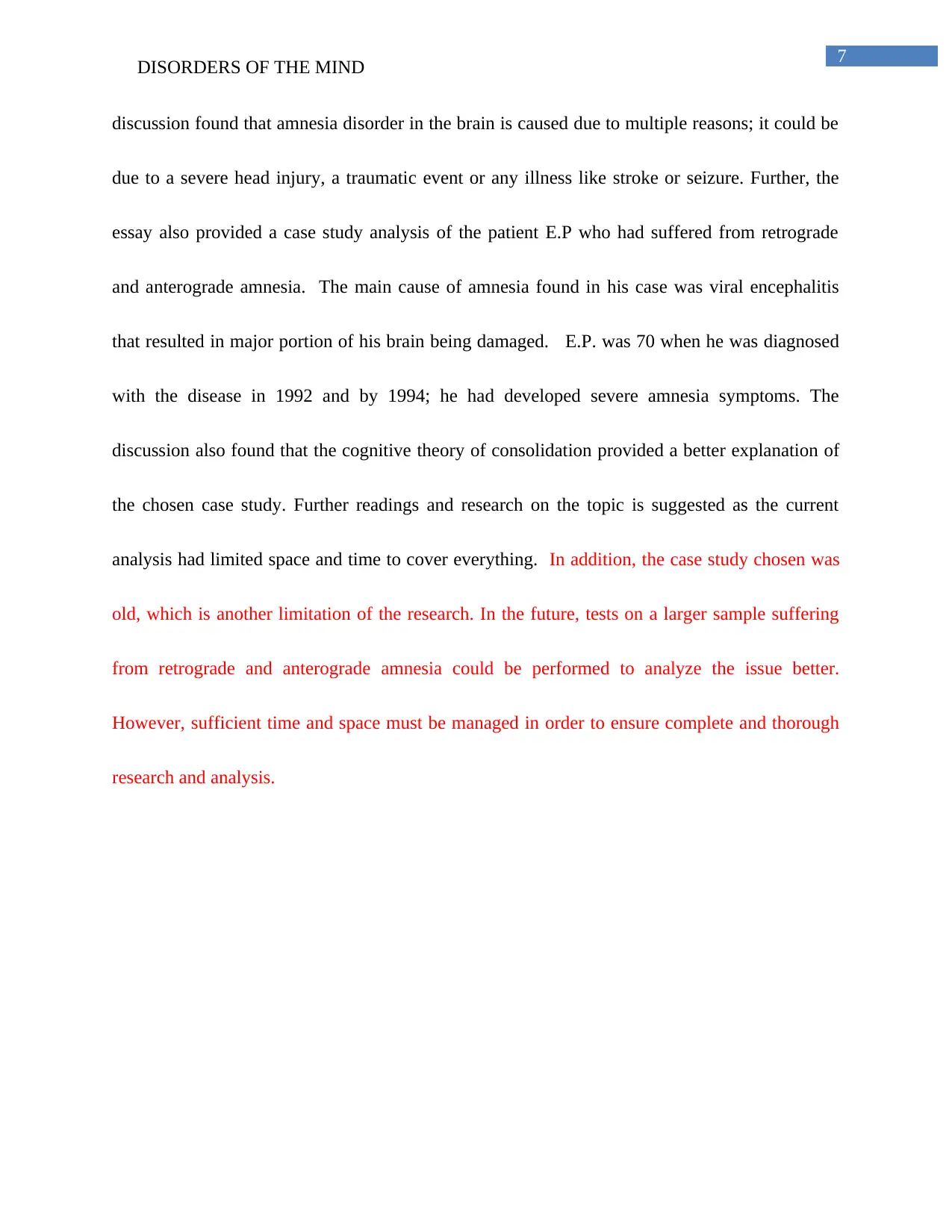
7
DISORDERS OF THE MIND
discussion found that amnesia disorder in the brain is caused due to multiple reasons; it could be
due to a severe head injury, a traumatic event or any illness like stroke or seizure. Further, the
essay also provided a case study analysis of the patient E.P who had suffered from retrograde
and anterograde amnesia. The main cause of amnesia found in his case was viral encephalitis
that resulted in major portion of his brain being damaged. E.P. was 70 when he was diagnosed
with the disease in 1992 and by 1994; he had developed severe amnesia symptoms. The
discussion also found that the cognitive theory of consolidation provided a better explanation of
the chosen case study. Further readings and research on the topic is suggested as the current
analysis had limited space and time to cover everything. In addition, the case study chosen was
old, which is another limitation of the research. In the future, tests on a larger sample suffering
from retrograde and anterograde amnesia could be performed to analyze the issue better.
However, sufficient time and space must be managed in order to ensure complete and thorough
research and analysis.
DISORDERS OF THE MIND
discussion found that amnesia disorder in the brain is caused due to multiple reasons; it could be
due to a severe head injury, a traumatic event or any illness like stroke or seizure. Further, the
essay also provided a case study analysis of the patient E.P who had suffered from retrograde
and anterograde amnesia. The main cause of amnesia found in his case was viral encephalitis
that resulted in major portion of his brain being damaged. E.P. was 70 when he was diagnosed
with the disease in 1992 and by 1994; he had developed severe amnesia symptoms. The
discussion also found that the cognitive theory of consolidation provided a better explanation of
the chosen case study. Further readings and research on the topic is suggested as the current
analysis had limited space and time to cover everything. In addition, the case study chosen was
old, which is another limitation of the research. In the future, tests on a larger sample suffering
from retrograde and anterograde amnesia could be performed to analyze the issue better.
However, sufficient time and space must be managed in order to ensure complete and thorough
research and analysis.
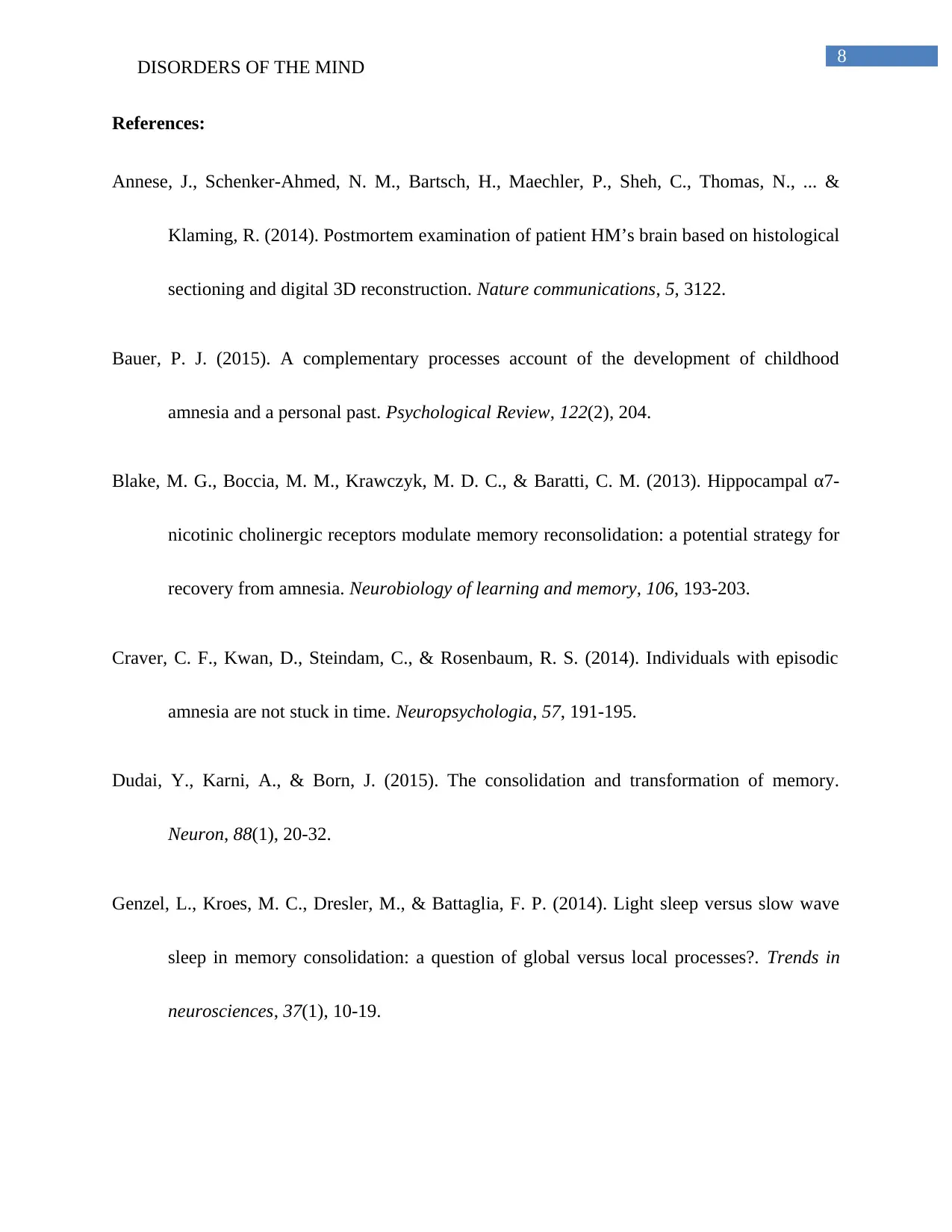
8
DISORDERS OF THE MIND
References:
Annese, J., Schenker-Ahmed, N. M., Bartsch, H., Maechler, P., Sheh, C., Thomas, N., ... &
Klaming, R. (2014). Postmortem examination of patient HM’s brain based on histological
sectioning and digital 3D reconstruction. Nature communications, 5, 3122.
Bauer, P. J. (2015). A complementary processes account of the development of childhood
amnesia and a personal past. Psychological Review, 122(2), 204.
Blake, M. G., Boccia, M. M., Krawczyk, M. D. C., & Baratti, C. M. (2013). Hippocampal α7-
nicotinic cholinergic receptors modulate memory reconsolidation: a potential strategy for
recovery from amnesia. Neurobiology of learning and memory, 106, 193-203.
Craver, C. F., Kwan, D., Steindam, C., & Rosenbaum, R. S. (2014). Individuals with episodic
amnesia are not stuck in time. Neuropsychologia, 57, 191-195.
Dudai, Y., Karni, A., & Born, J. (2015). The consolidation and transformation of memory.
Neuron, 88(1), 20-32.
Genzel, L., Kroes, M. C., Dresler, M., & Battaglia, F. P. (2014). Light sleep versus slow wave
sleep in memory consolidation: a question of global versus local processes?. Trends in
neurosciences, 37(1), 10-19.
DISORDERS OF THE MIND
References:
Annese, J., Schenker-Ahmed, N. M., Bartsch, H., Maechler, P., Sheh, C., Thomas, N., ... &
Klaming, R. (2014). Postmortem examination of patient HM’s brain based on histological
sectioning and digital 3D reconstruction. Nature communications, 5, 3122.
Bauer, P. J. (2015). A complementary processes account of the development of childhood
amnesia and a personal past. Psychological Review, 122(2), 204.
Blake, M. G., Boccia, M. M., Krawczyk, M. D. C., & Baratti, C. M. (2013). Hippocampal α7-
nicotinic cholinergic receptors modulate memory reconsolidation: a potential strategy for
recovery from amnesia. Neurobiology of learning and memory, 106, 193-203.
Craver, C. F., Kwan, D., Steindam, C., & Rosenbaum, R. S. (2014). Individuals with episodic
amnesia are not stuck in time. Neuropsychologia, 57, 191-195.
Dudai, Y., Karni, A., & Born, J. (2015). The consolidation and transformation of memory.
Neuron, 88(1), 20-32.
Genzel, L., Kroes, M. C., Dresler, M., & Battaglia, F. P. (2014). Light sleep versus slow wave
sleep in memory consolidation: a question of global versus local processes?. Trends in
neurosciences, 37(1), 10-19.
⊘ This is a preview!⊘
Do you want full access?
Subscribe today to unlock all pages.

Trusted by 1+ million students worldwide
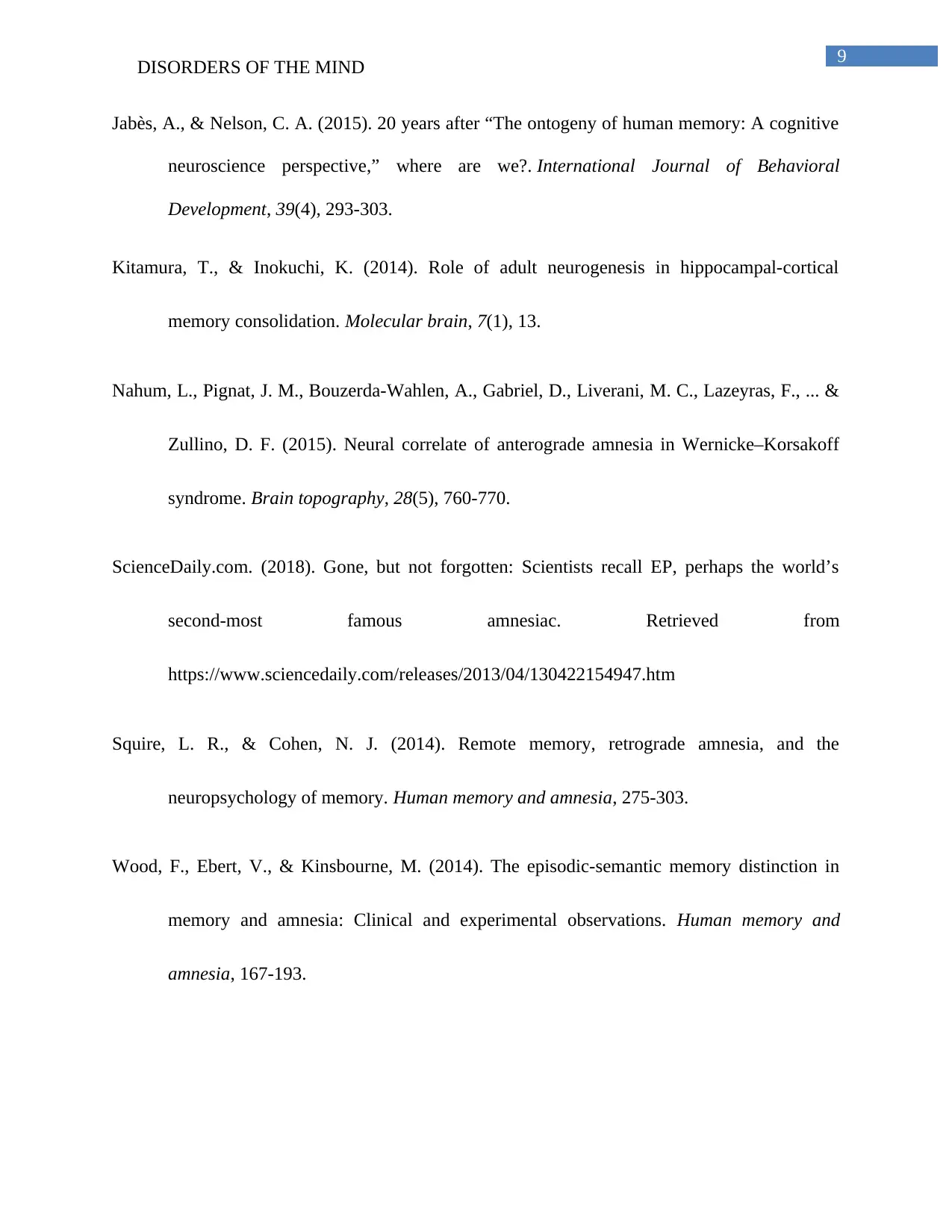
9
DISORDERS OF THE MIND
Jabès, A., & Nelson, C. A. (2015). 20 years after “The ontogeny of human memory: A cognitive
neuroscience perspective,” where are we?. International Journal of Behavioral
Development, 39(4), 293-303.
Kitamura, T., & Inokuchi, K. (2014). Role of adult neurogenesis in hippocampal-cortical
memory consolidation. Molecular brain, 7(1), 13.
Nahum, L., Pignat, J. M., Bouzerda-Wahlen, A., Gabriel, D., Liverani, M. C., Lazeyras, F., ... &
Zullino, D. F. (2015). Neural correlate of anterograde amnesia in Wernicke–Korsakoff
syndrome. Brain topography, 28(5), 760-770.
ScienceDaily.com. (2018). Gone, but not forgotten: Scientists recall EP, perhaps the world’s
second-most famous amnesiac. Retrieved from
https://www.sciencedaily.com/releases/2013/04/130422154947.htm
Squire, L. R., & Cohen, N. J. (2014). Remote memory, retrograde amnesia, and the
neuropsychology of memory. Human memory and amnesia, 275-303.
Wood, F., Ebert, V., & Kinsbourne, M. (2014). The episodic-semantic memory distinction in
memory and amnesia: Clinical and experimental observations. Human memory and
amnesia, 167-193.
DISORDERS OF THE MIND
Jabès, A., & Nelson, C. A. (2015). 20 years after “The ontogeny of human memory: A cognitive
neuroscience perspective,” where are we?. International Journal of Behavioral
Development, 39(4), 293-303.
Kitamura, T., & Inokuchi, K. (2014). Role of adult neurogenesis in hippocampal-cortical
memory consolidation. Molecular brain, 7(1), 13.
Nahum, L., Pignat, J. M., Bouzerda-Wahlen, A., Gabriel, D., Liverani, M. C., Lazeyras, F., ... &
Zullino, D. F. (2015). Neural correlate of anterograde amnesia in Wernicke–Korsakoff
syndrome. Brain topography, 28(5), 760-770.
ScienceDaily.com. (2018). Gone, but not forgotten: Scientists recall EP, perhaps the world’s
second-most famous amnesiac. Retrieved from
https://www.sciencedaily.com/releases/2013/04/130422154947.htm
Squire, L. R., & Cohen, N. J. (2014). Remote memory, retrograde amnesia, and the
neuropsychology of memory. Human memory and amnesia, 275-303.
Wood, F., Ebert, V., & Kinsbourne, M. (2014). The episodic-semantic memory distinction in
memory and amnesia: Clinical and experimental observations. Human memory and
amnesia, 167-193.
1 out of 10
Your All-in-One AI-Powered Toolkit for Academic Success.
+13062052269
info@desklib.com
Available 24*7 on WhatsApp / Email
![[object Object]](/_next/static/media/star-bottom.7253800d.svg)
Unlock your academic potential
Copyright © 2020–2026 A2Z Services. All Rights Reserved. Developed and managed by ZUCOL.

